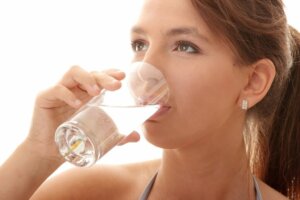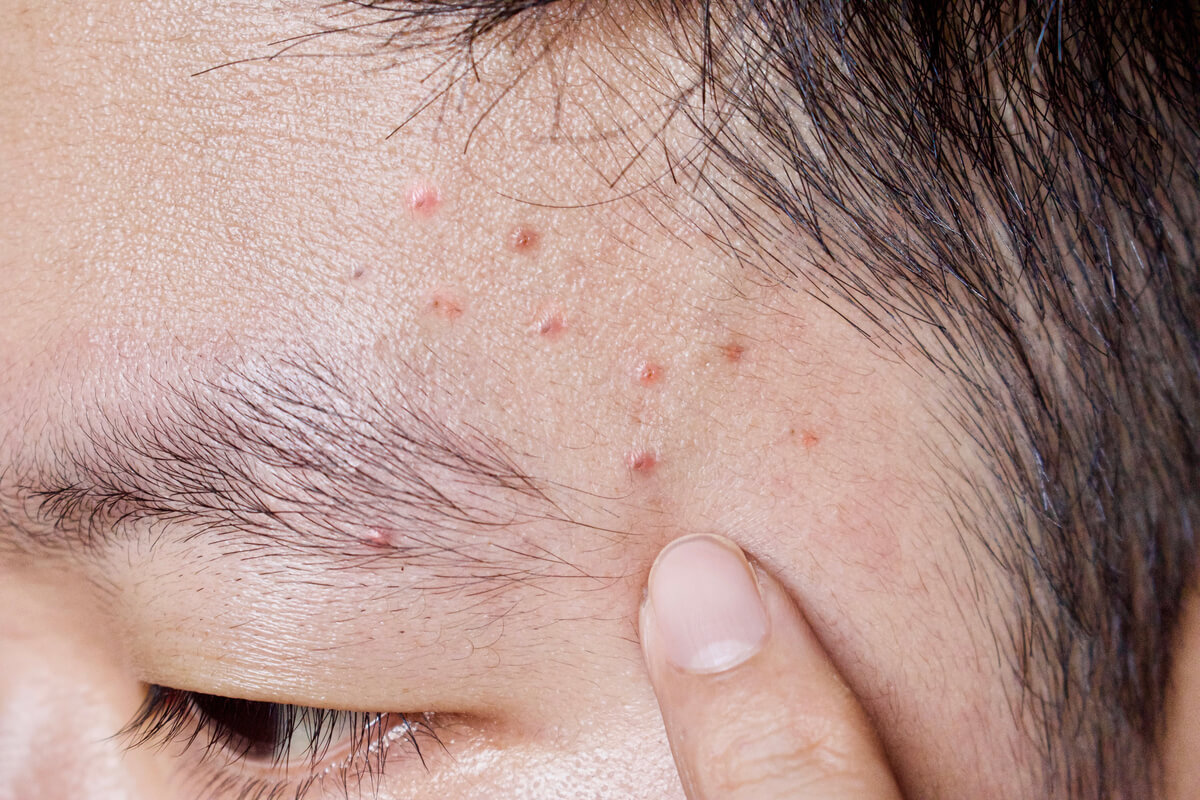Does Drinking Water Help to Treat Acne?

Have you ever heard people say that drinking water helps to treat acne? It could be true. However, although these days we have much more information than a few decades ago, there’s still much to learn about acne. This is especially so when it comes to the relationship between acne and diet, sleep, and hydration.
Acne is one of the most common skin conditions worldwide. It can affect anyone, regardless of age, gender, and skin type. And given its multifactorial origin and the wide variety of manifestations it has, it’s certainly a complex problem.
Despite all this, the good news is that acne can be treated and that good lifestyle habits can significantly contribute to skin health.
What causes acne?

Generally speaking, acne is the result of the accumulation of dead cells, excess dry sebum, and bacteria (such as P. acnes) on the skin.
In relation to this, the MSD Manual specifies: “acne is due to an interaction of hormones, sebum, and bacteria that results in an inflammation of the hair follicles (the pores of the skin where the hair grows)”.
Some of the factors that can influence the appearance of acne are the following:
- Stress
- Genetics
- Hormonal activity
- The use of certain medications and topical products, among others.
How does water influence the skin?
In an article entitled Dietary water affects human skin hydration and biomechanics, the researchers state that, in general terms:
- Water plays a fundamental role in normal physiological balance.
- In terms of skin health, this association between water and better (skin) performance has been widely accepted.
- Water is the medium that allows all the body’s transport systems to function. It also acts as a carrier, and so it has a central role in cell homeostasis.
- It plays an important role in thermoregulation and acts as a lubricant and shock absorber.
Does drinking water help to treat acne?

Some consider that the consumption of water, as it’s so beneficial for skin balance in several different ways, can influence the amount of sebum that the skin produces. For this reason, they claim that drinking water helps to treat acne.
In a study on the relationship between water consumption and the appearance of skin wrinkles, carried out in women between 50 and 60 years of age, it was observed that those who maintained adequate water consumption had more subtle wrinkles compared to those who drank little water.
The conclusion was as follows:
“There seems to be a significant correlation between the amount of water consumed and sebum levels and skin wrinkles. Sebum levels are more or less decisive for facial wrinkles.”
Even so, throughout the study, experts emphasized that water consumption couldn’t reverse or stop aging, nor could it prevent the increasingly dry skin that can occur over the years. Nothing was stated regarding sebum production and acne.
As stated in another study published in the International Journal of Cosmetic Science :
“Adequate fluid intake, particularly non-alcoholic, caffeine-free and calorie-free beverages, such as water, has been shown to be beneficial for various aspects of general health and protect against various diseases.”
The same study also explains that, although it’s recognized that water is a beneficial liquid for our health in general, there’s little evidence about its benefits for skin health.
Water is important, but other factors must be considered
Even so, at the moment it still isn’t possible to say for certain if a certain amount of water (8 glasses a day, for example) is especially beneficial for the skin. Nor is it possible to say if mineral water is more suitable than drinking water, or if there’s any other type of water that can contribute better than others to skin health.
In view of everything we’ve seen, what we can say is that, even though it remains to be seen how exactly water can be more beneficial for skin health, regularly consuming sufficient quantities, all within a healthy lifestyle, is certainly recommended. And much more so than any other drink.
Have you ever heard people say that drinking water helps to treat acne? It could be true. However, although these days we have much more information than a few decades ago, there’s still much to learn about acne. This is especially so when it comes to the relationship between acne and diet, sleep, and hydration.
Acne is one of the most common skin conditions worldwide. It can affect anyone, regardless of age, gender, and skin type. And given its multifactorial origin and the wide variety of manifestations it has, it’s certainly a complex problem.
Despite all this, the good news is that acne can be treated and that good lifestyle habits can significantly contribute to skin health.
What causes acne?

Generally speaking, acne is the result of the accumulation of dead cells, excess dry sebum, and bacteria (such as P. acnes) on the skin.
In relation to this, the MSD Manual specifies: “acne is due to an interaction of hormones, sebum, and bacteria that results in an inflammation of the hair follicles (the pores of the skin where the hair grows)”.
Some of the factors that can influence the appearance of acne are the following:
- Stress
- Genetics
- Hormonal activity
- The use of certain medications and topical products, among others.
How does water influence the skin?
In an article entitled Dietary water affects human skin hydration and biomechanics, the researchers state that, in general terms:
- Water plays a fundamental role in normal physiological balance.
- In terms of skin health, this association between water and better (skin) performance has been widely accepted.
- Water is the medium that allows all the body’s transport systems to function. It also acts as a carrier, and so it has a central role in cell homeostasis.
- It plays an important role in thermoregulation and acts as a lubricant and shock absorber.
Does drinking water help to treat acne?

Some consider that the consumption of water, as it’s so beneficial for skin balance in several different ways, can influence the amount of sebum that the skin produces. For this reason, they claim that drinking water helps to treat acne.
In a study on the relationship between water consumption and the appearance of skin wrinkles, carried out in women between 50 and 60 years of age, it was observed that those who maintained adequate water consumption had more subtle wrinkles compared to those who drank little water.
The conclusion was as follows:
“There seems to be a significant correlation between the amount of water consumed and sebum levels and skin wrinkles. Sebum levels are more or less decisive for facial wrinkles.”
Even so, throughout the study, experts emphasized that water consumption couldn’t reverse or stop aging, nor could it prevent the increasingly dry skin that can occur over the years. Nothing was stated regarding sebum production and acne.
As stated in another study published in the International Journal of Cosmetic Science :
“Adequate fluid intake, particularly non-alcoholic, caffeine-free and calorie-free beverages, such as water, has been shown to be beneficial for various aspects of general health and protect against various diseases.”
The same study also explains that, although it’s recognized that water is a beneficial liquid for our health in general, there’s little evidence about its benefits for skin health.
Water is important, but other factors must be considered
Even so, at the moment it still isn’t possible to say for certain if a certain amount of water (8 glasses a day, for example) is especially beneficial for the skin. Nor is it possible to say if mineral water is more suitable than drinking water, or if there’s any other type of water that can contribute better than others to skin health.
In view of everything we’ve seen, what we can say is that, even though it remains to be seen how exactly water can be more beneficial for skin health, regularly consuming sufficient quantities, all within a healthy lifestyle, is certainly recommended. And much more so than any other drink.
- Guerra Tapia, Aurora, Raúl de Lucas Laguna, José Carlos Moreno Giménez, Montserrat Pérez López, Ii Miquel Ribera Pibernat, Elena Martínez Prats, Rosa Senan Sanz, José Casas Rivero, and Universitario La Paz Madrid. 2015. “Consensus in the Topical Treatment of Acne.” Med Cutan Iber Lat Am. Vol. 43. www.medigraphic.com/medicinacutaneawww.medigraphic.org.mxwww.medigraphic.org.mx.
- Keri, Jonette E. n.d. “Acné – Trastornos de La Piel – Manual MSD Versión Para Público General.” Manual MSD- Versión Para Público General. Accessed June 1, 2021. https://www.msdmanuals.com/es/hogar/trastornos-de-la-piel/acné-y-trastornos-relacionados/acné.
- Palma L, Marques LT, Bujan J, Rodrigues LM. Dietary water affects human skin hydration and biomechanics. Clin Cosmet Investig Dermatol. 2015 Aug 3;8:413-21. doi: 10.2147/CCID.S86822. PMID: 26345226; PMCID: PMC4529263.
-
S. Williams, N. Krueger. 2007. “Effect of Fluid Intake on Skin Physiology: Distinct Differences between Drinking Mineral Water and Tap Water.” International Journal of Cosmetic Science, no. 2: 131–38. https://www.researchgate.net/publication/270591768_Effect_of_fluid_intake_on_skin_physiology_distinct_differences_between_drinking_mineral_water_and_tap_water.
-
Varios. 2019. “Tratamiento Del Acné.” Boletín Terapéutico Andaluz 34 (4): 38–48.
-
Zaenglein, Andrea L., Arun L. Pathy, Bethanee J. Schlosser, Ali Alikhan, Hilary E. Baldwin, Diane S. Berson, Whitney P. Bowe, et al. 2016. “Guidelines of Care for the Management of Acne Vulgaris.” Journal of the American Academy of Dermatology 74 (5): 945-973.e33. https://doi.org/10.1016/j.jaad.2015.12.037.
Este texto se ofrece únicamente con propósitos informativos y no reemplaza la consulta con un profesional. Ante dudas, consulta a tu especialista.







